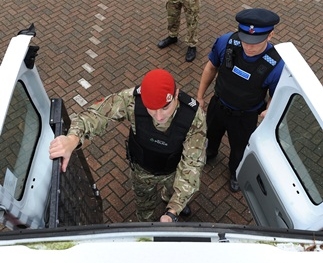News that Military Police are now routinely patrolling an area of Birmingham gives Dave Woodhall concerns for the future.
You may not have noticed if you steer clear of the area, but Broad Street is now being patrolled by Military Police. The area hasn’t been the subject of a coup and as far as I know it isn’t heavily patronised by the armed forces, but they’re here on the streets of Birmingham helping the local police and bar security staff.
But who are they really helping, and why is their presence necessary?
Major Deborah Scott, who commands the local Royal Military Police unit, says that this is a common occurrence throughout the country, “The Royal Military Police regularly conduct joint patrols with our civilian counterparts; this enables good working relationships to be built between the military and civilian policing agencies.”
Fine in theory, but Birmingham isn’t a garrison town like Aldershot, we don’t have large numbers of forces personnel in the city and if we do they aren’t in uniform so presumably can’t be easily identified. All of which makes me wonder what exactly is the point of having soldiers patrolling the streets of our city. They have no more powers over ordinary citizens than you or I do, so why are they here? Why do they need these “good working relationships” with a police force they would otherwise rarely, if ever, come in to contact with?
Last October I wrote about the introduction of breathalysers by pubs in Selly Oak, to monitor customers for drunkenness. I said at that time that it wouldn’t be long before this and other initiatives were rolled out across the city, and last month the devices were introduced on Broad Street. Bar owners loved them, because apart from anything else they gave an increased power of veto over drinking elsewhere, but customers were less keen.
The gist of the article I wrote then was to air my concern at the increasingly blurred line between police and private security agencies, and the worryingly high levels of surveillance that law-abiding citizens now endure and are told they must welcome as being for their own safety.
To enter a Broad Street bar a customer might have to prove their sobriety, as well as the long-established ritual of age and identity. These are accepted as everyday measures. Now we are seeing the armed forces patrol the street – another development, we are told, that we should accept because it’s for our own safety.
Broad Street might not be the most pleasant place in Birmingham and I would guess that the sheer volume of people who flood into the area at the weekend means that crime and disorder levels are higher than average. However, if there is a particular problem with keeping the peace then that should be down to the police to solve. It’s what happens at football matches and political demonstrations; it’s what should happen on our streets and in any public place.
We should not have our civil liberties eroded or be subject to an ever-growing intrusion into our everyday business by growing numbers of security personnel just to make someone’s life a bit easier or to save money. And we should never accept that these developments are to help us when they are in fact conditioning the population into accepting authoritarian amounts of surveillance over our day to day lives. Each one, whether it be having to prove that you haven’t spent money anywhere else before being allowed into a bar, being caught on CCTV on average 300 times a day or being asked to confirm your identity by someone who has no legal right to do so, might not sound much in isolation but added together they became an attack on personal liberty that would have been unthinkable even a decade ago
It might sound alarmist, but Major Scott’s final words on this subject should also be cause for concern. “It also allows us to develop and maintain our policing capability should we be required to deploy on operations overseas.”
It also gives a handy indication of how easily the sight of the military deploying on the streets of a major British city can become. But it’s only for our safety, so we shouldn’t be alarmed.
